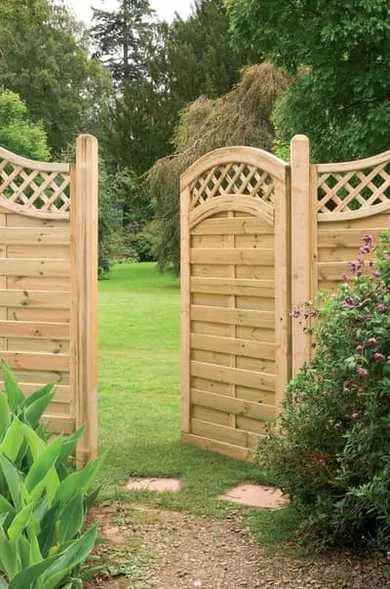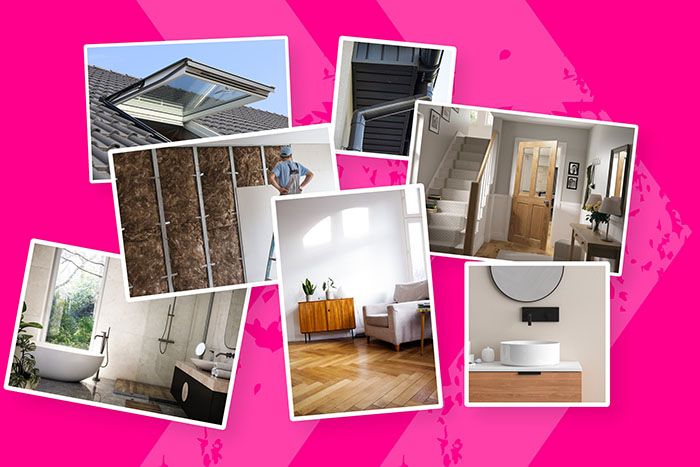The great British garden has a long and noble history. And even if you’re not a die-hard fan of, say, Your Garden Made Perfect or Love Your Garden, we bet you too are looking for ways to spruce yours up.
Now, whether you’re going for a quaint picket fence and gate look or a fancy fence gate design, the right garden gate is the final piece of the puzzle.
The question is:
With so many options out there, how do you go about choosing the right one?
At Door Superstore, we’re here to help. We’ve put together the ultimate garden gate buyers guide to help you find the best garden gate for your needs.
Table of contents:
- What is the best material for a garden gate?
- Standard garden gate sizes
- Average garden gate cost
- How to fit a side gate
- How do I choose a garden gate?
What is the best material for a garden gate?
The first thing to consider when choosing a garden gate is the material. As you’d expect, garden gates come in a variety of materials and designs. Depending on whether you’re looking for an entrance, back or side garden gate, you can choose from timber, metal, vinyl, uPVC and more.
That being said, timber and metal are the most popular choices by far. With that in mind, let’s take a close look at what these two have going for them.
Wooden gates
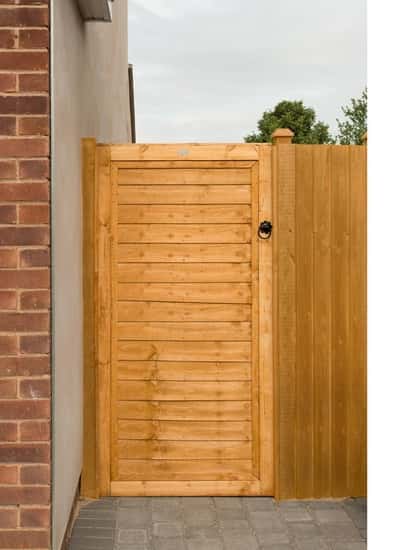
When it comes to a front garden gate, wood remains a perennial favourite for several reasons.
First, it will improve your property security because a wooden garden gate is a solid garden gate.
Second, whether you opt for simple wooden gate designs for practicality, rustic garden gates for a countryside look and feel or a highly decorative wooden arch with gate design for a WOW effect, a wooden gate will improve your garden and property’s look and feel, immensely.
Third, you can choose from multiple softwood and hardwood options that all come with different strengths and weaknesses.
Here’s the scoop:
Softwood timber gates, typically made from Scandinavian redwood, are a popular, cost-effective option. However, they need to be treated every one-and-a-half to two years or they will deteriorate when exposed to the elements.
In contrast, hardwood timber gates, typically made from European oak or iroko, are highly durable and can easily last for decades so long as you look after them properly. Because hardwood is a lot denser and sturdier than softwood, these types of gates are far more resistant to bugs, rain and UV rays. On the downside, they can be considerably more expensive.
Next, we have:
Metal gates
Metal gates are more commonly used as driveaway or entrance gates – but that doesn’t mean you can’t have a metal garden gate! In fact, metal gates are widely used as both front and side garden gates.
Here’s what you need to know about them:
Metal gates come in a wide range of designs and offer a classic look that works best with metal or brick (as opposed to wooden) fences. The higher-end ones on the market are treated for protection against rust and corrosion, making them virtually maintenance-free, unlike wooden ones.
Another thing that metal gates have going for them is the fact that they allow passers-by to feast their eyes on the marvels of your garden while also making your garden feel more spacious and sunlit.
The downside of this, of course, is that you get less privacy and somewhat reduced protection. That’s why we wouldn’t recommend installing a back garden gate unless it’s quite tall and has spiked ends.
Standard garden gate sizes
Once you’ve decided on a material, you’ll have to consider the size. If you’re replacing an existing garden gate, you’re rather limited in that regard and might need to consider a made-to-measure garden gate.
But if it’s a fairly standard gate size or even a brand-new build, you won’t be short of options.
By this point, you’re probably wondering:
What is the average height of a garden gate?
Most garden gates in the UK, whether wooden or metal, are approximately 6ft (1.83m) tall, give or take a couple of inches. This height is sufficient to prevent intruders from climbing over them easily and your pets or other animals from jumping over them.
However, taller gates of around 7.6ft (2.3m) are also readily available, should you feel you need the extra privacy and protection. Taller gates work great as side and back garden gates because this is most likely where potential intruders will try to enter your property.
It’s also possible to find shorter gates of around 3ft (0.91m) in height. Since most fences are also around this height, opting for a 3ft gate will create a seamless pattern that will allow your garden to blend in naturally with the outside space. So, it’s not surprising that it’s one of the more popular garden entrance ideas you’re likely to come across in many British villages.
This brings us to the second question, namely:
What is the average width of a garden gate?
The standard gate width in the UK is around 3ft. That’s sufficiently wide to allow you to walk through unimpeded. Slightly narrower gates are also offered, as many people prefer a small garden gate on the side of their garden.
If you’re looking for something wider than 4ft (1.22m), which you might want to consider for a front garden gate, it’s best to opt for a double rather than a single gate.
However, when thinking about what is a good width for a garden gate, keep in mind that double gates will be considerably more expensive than single ones. So, make sure you budget accordingly.
Speaking of which…
Average garden gate cost
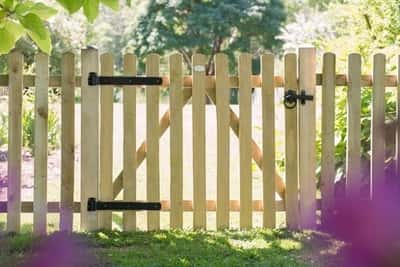
The price of both metal and wooden garden gates varies enormously.
But that’s not very helpful, is it?
Let’s try to narrow things down a bit:
When it comes to metal garden gates, the type of metal (steel, aluminium, wrought iron, cast iron), size, style and finish all play a part, with average prices ranging anywhere from £70 to over £400 for a single gate.
This is very much the story with wooden garden gates, where the type of wood and finishing are particularly important. As we mentioned earlier, softwood is considerably cheaper than hardwood, but you need to factor in higher long-term maintenance costs.
To give you an example:
A single standard-size softwood garden door will set you back anywhere between £70 and £300. In contrast, its hardwood equivalents tend to start at around £270. Keep in mind that some suppliers offer the same model in both hardwood and softwood.
How about the cost of installation?
If you hire a handyman, the average cost of hanging a metal gate on brickwork is likely to be around £175. It might come as a surprise, but the average cost of fitting a timber garden gate with two wooden posts is more than twice that at a whopping £400.
As always, these are UK averages, so the actual price you’re going to pay at the end of the day is likely to vary considerably depending on where you live. You can get a quote from a local tradesperson on Checkatrade.
How to fit a side gate
If the cost of hiring a professional to fit your wooden garden gate sounds a bit too much, and you’re feeling confident in your DIY skills, you can try hanging a garden gate yourself. The process is essentially the same, whether it’s a front, back or side gate.
What’s more, it’s fairly straightforward. Here’s a brief overview:
You’ll have to paint your new gate first. Once it’s fully dry, you need to attach the door hinges, mount the gate and attach the latch. Depending on how heavy and wide your gate is, you might need an extra pair of hands.
Still fancy giving it a go?
Then check out our step-by-step guide on how to hang a garden gate for more details.
How do I choose a garden gate?
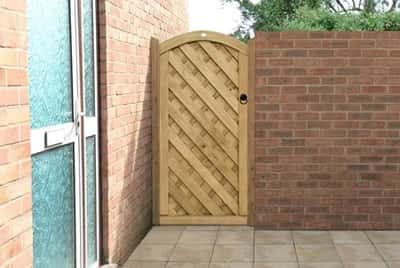
A garden gate will make a lovely addition to the front, rear and side entrance(s) of your garden.
When choosing a garden gate, it’s important to think carefully about its primary function before rushing to make a purchase you might regret later.
You need to ask yourself:
Is security, privacy or aesthetic appeal more important? One out of three? Two out of three? All of the above? Something else entirely?
Make sure you take your time with this one because it’s vital.
Once you have your answer, you’ll need to decide on a budget. After this, you should have no trouble choosing the appropriate size and material. As we’ve pointed out, both wooden and metal garden doors have their pros and cons, as do different sizes.
Keep our garden gate buyers guide handy, and you’ll have no trouble choosing a garden gate that will be the perfect fit and quickly become the envy of all your neighbours!

